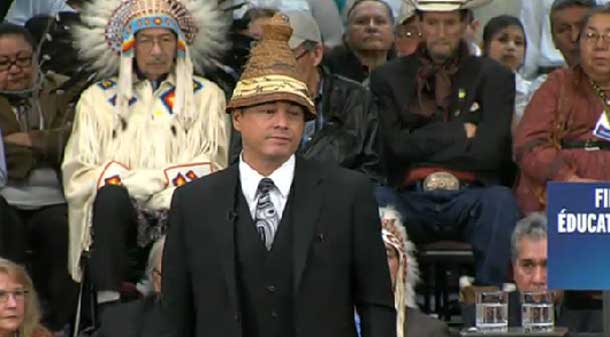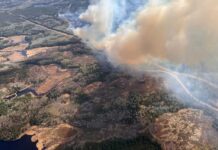
Update from National Chief Atleo
OTTAWA – Last week, I had the honour to participate in the final national public event of the Truth and Reconciliation Commission of Canada, during which I said that I believed the time had come to support one another fully and to put the next generation first. We will never forget the residential schools. It is a legacy we know too well as we live it every day. But I hear many voices telling us that we must not pass the burden on to another generation. They must learn of this history but they also must learn about themselves, their identity as proud First Nations citizens, their songs, stories and languages. We are still here and we are strong. Perhaps our ultimate response to the residential schools is to say loud and clear to all of Canada: we are still here, and we will again resume our rightful place and our responsibilities to nurture our children, to protect and to advance our languages, our cultures, our lands and territories.
I have visited many communities and I hear a great deal of support for action on education, and I also hear concerns. I fully understand these responses. This work is critically important and we must get it right. We cannot abandon another generation to a failing system and collapsing schools. The last thing we want to do, though, is to take no action or, worse, allow the government to do this work for us. Neither alternative is acceptable. We will not tell our children and students that they must wait longer for the quality of education they deserve. We can never let the government move on unilateral approaches that could compromise our rights, Treaties, title or jurisdiction or contradict the spirit of our agreements.
This is why the direction received from Chiefs-in-Assembly last December was so critical. Resolution 21/2013 set five clear conditions for the path forward and mandated urgent attention and action at the national level to have the conditions fully met, including secure and fair funding guaranteed for our kids. This work is important and it builds on decades of advocacy, research and experience. The conditions stem from our 2010 position paper First Nations Control of First Nations Education, which in turn builds on the 1972 policy paper Indian Control of Indian Education and numerous reports, studies and contributions from First Nations leaders and education experts.
Based on our collective advocacy, we successfully secured significant new funding for First Nations education and we have once and for all eliminated the 2% cap that’s been holding our students back (see attachment). In addition, the Government announced it would meet the five conditions in new legislation affirming First Nation control of First Nation education. The advocacy to get us to this point has been important and consistent with the clear mandate set by Chiefs-in-Assembly. Still, it will be up to every region, every First Nation to determine their next steps and response in accordance with their rights, responsibilities and direction from their people to fully advance education success for all of their students.
It is important to remember that this process will be a long journey with these being only the first few steps. Affirming First Nation control, ensuring fair, stable funding including support for languages and culture is only an interim step to First Nations themselves advancing their own systems through nation-to-nation discussion and confirmation of their own agreements, Treaty implementation or First Nation laws and arrangements with others.
To support the analysis and effort going forward, AFN compiled First Nations Control of First Nations Education: A framework to achieve success in First Nation education. This document, available on the AFN website, expands on the five principles of First Nations control and sets out key elements for each principle. A draft of this framework was shared with the Chiefs Committee on Education in January 2014 to obtain local and regional perspectives. I encourage you to review the framework but want to briefly note some points from the framework as to what we will be looking for in any federal legislation:
Jurisdiction
Respects and recognizes inherent rights and title, Treaty rights, and First Nation Control of First Nation Education jurisdiction. First Nations must retain all options to advance their education and all such agreements must be fully respected, enabled and supported. On this point, we must be perfectly clear in our expectation that First Nations Treaty and inherent rights will be respected. Agreements advancing First Nation education through Treaty implementation, nation-re-building or self-government will be respected, enabled and supported.
Funding
Provides a statutory guarantee for funding of First Nations education as a precondition that is sustainable and reflects needs-based costs consistent with Canada’s obligation. The elimination of gaps in funding is required, including the removal of restraints as well as the establishment of a fair rate to respond to growth in demographics and education needs. There must be support for transition and the development of systems, explicit support for language and culture programming and support that guarantees safe, secure, healthy learning environments and facilities.
Language and Culture
Enables and support systems to provide full immersion and grounding of all education in Indigenous languages and cultures. First Nations education requires the inclusion of First Nations knowledge and languages and it requires teaching and learning in those languages and cultures. Language and culture must be funded as core curriculum. Cultural experts, Elders and parents must be fully engaged in First Nations education systems.
Reciprocal Accountability and Transparency
Develops mechanisms to oversee, evaluate, and provide for reciprocal accountability and ensure there is no unilateral federal oversight and authority. First Nations education must be controlled and supported by First Nations. First Nations must have the autonomy to design systems, codes and laws. Parental involvement and parental responsibility assured by transparent local control is the basis for First Nations education.
Meaningful Dialogue
Ensures a meaningful support process to address these conditions through a commitment to working together through co-development, fully reflective of First Nations rights and jurisdiction. Canada must commit to direct dialogue and discussion throughout development including regulation and establishing agreements with First Nations communities specific to their approach to advancing education, including Treaty implementation or other agreement.
The work leading to this framework started months ago with regional dialogue and discussion that saw First Nations articulating their visions of First Nations control of First Nations education. The AFN will continue to support and help facilitate this work and will prepare a final overview paper in early April.
It is up to each First Nation and region to determine how they see these five conditions being achieved in a manner that respects their rights and interests. The AFN is not a rights holder – First Nations themselves must drive the next steps as only First Nations can articulate, design and build their own education systems.
Despite our inherent diversity across the country, there has been absolute agreement that the status quo in education is unacceptable and must end. We must not only oppose the status quo and a failing system, we must articulate what is required to achieve success and drive our own approaches based on our requirements. But we can work together, support and respecting one another as we pursue our own paths to a shared goal of success for our children.
I have full faith and confidence in our people – our Elders, our experts, our leaders, our youth – that we have the answers, the commitment and the solutions to realize our vision of First Nations control of First Nations education.
We will continue to engage widely with First Nations in the coming weeks and we will support First Nations in setting their strategies and their approach to First Nations control of First Nations education.
Update: Action on Missing and Murdered Indigenous Woman and Girls
On Monday March 10, 2014, I met with leaders of national Indigenous organizations, specifically the Native Women’s Association of Canada, the Métis National Council, the National Association of Friendship Centres and the Congress of Aboriginal Peoples. Our purpose was to discuss immediate action on the issue of missing and murdered Indigenous women and girls. This meeting came in the wake of a tremendously disappointing report released on March 7 by Parliament’s Special Committee on Violence Against Indigenous Women.
We met to discuss our strategies moving forward as we cannot accept the status quo or the limited approach taken by this government. We all agreed that urgent action is required. At the meeting, all those present reaffirmed our call for a national public commission of inquiry on missing and murdered Indigenous women and girls. We came to a common position that all our efforts need to be coordinated, including awareness and ongoing advocacy that advances considerations for a national inquiry as well as immediate actions to ensure safety and security for Indigenous women and girls.
There was an agreement among the organizations to take matters into our own hands and begin drafting our own terms of reference for a national inquiry so that it is inclusive, focused and constructive. We will seek options to move this forward with partners with or without support from the government.
Another idea brought forward was the possibility of establishing a national research centre dedicated to the safety of Indigenous women. We will continue working on this and other ideas in advance of many upcoming opportunities to raise the profile of this important issue and to continue mobilizing support among Parliamentarians, provinces and territories and international partners.
All Indigenous organizations are committed to advancing their own action plans and sharing these efforts as a way to affirm solidarity, coordinate our work and strengthen our individual actions. We are looking as well to important upcoming international reports from organizations such as the Inter-American Commission on Human Rights, the United Nations Committee to End Discrimination against Women, and the United Nations Special Rapporteur on the Rights of Indigenous Peoples to further advance the discussion and pressure Canada to act.
We are all in agreement that we will continue to push for action on this critical issue and work to ensure the safety and security of Indigenous women and girls.
Kleco, kleco!






